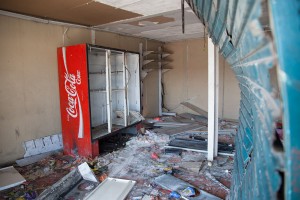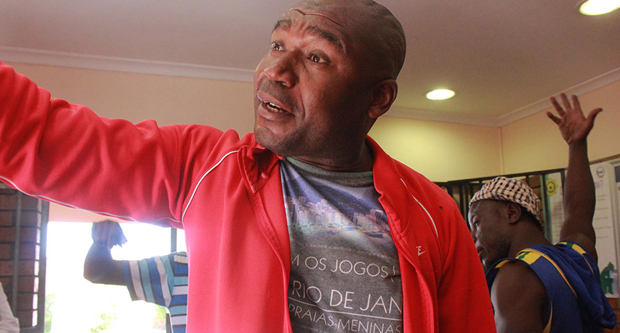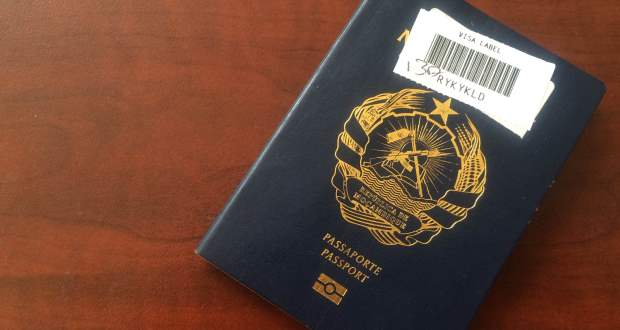We call the victims of xenophobic attacks foreign nationals, but I won’t do that here. The term “foreign†nationals creates a bigoted binary of us and them, and I think we’ve had enough bigotry in this country. Instead, I ask, when was the last time we considered that these xenophobic attacks are worsening the lives of refugees? By RA’EESA PATHER.
Not too long ago, the Daily Vox published an article on Femi Kuti, the son of music legend Fela Kuti. The Nigerian said he once saw South Africa as the nation that would liberate Africa. He was sorely disappointed, and it’s easy to see why.
Last week at the Philippi township police station just outside Cape Town, I spoke to a Nigerian man who had been driven from his shop by looters. Coincidentally, his name was Femi too. His hand was swollen, and he was barefoot – he had lost his shoes running for his life after a mob of community members had broken into his shop and stolen everything.
“They had knives and hammers, and they were just saying ‘Somalia, Somalia, Somalia must go’,†Femi Olumide told me. “They broke the roof and they took everything out. There’s nothing left.†Femi was wide-eyed and animated as he spoke, as if the adrenaline from the previous night’s violence was still coursing through his veins. South Africa may have overcome oppression 20 years ago, but we’ve surely made a mess of helping our neighbours in their pursuit of liberty.
“We need to understand that refugees and asylum seekers are here in this country legally and they are running away from terrible situations in their countries,†Vuyani Shuane from the Cape Town Refugee Centre told me. “Big cities attract foreign nationals who are seeking greener pastures. Remember, they must find ways to survive.â€
Out on the streets in the Marikana Land Occupation informal settlement, around the corner from the police station, rubber bullet casings littered the road, and in front of a battered Somali shop, a VCR tape lay wedged in the tar. The title on the label read “In Hellâ€, it had an 16V age restriction.
Many of the young men inside the store were younger than 16, but they were perhaps all too familiar with violence. At first glance, there was nothing left in the shop – the fridge was empty, and even the shelves had been taken away. But the youngsters had hammers and they were dismantling the shop entirely for scrap metal.

Ashraf Hendricks, a friend of mine and a photographer, had accompanied me to the area and we stumbled upon a looting that had just begun. Police were outside and the Somali owners were nowhere to be found. The neighbours next door to the shop told me they hadn’t seen the owners around, which meant we probably knew the shop was being looted before the owners. They would simply come back and find nothing.
I use the term “foreign nationals†every time xenophobic attacks erupt, but it always feels wrong. When we call a victim of a xenophobic attack a foreign national, it allows us to forget that they are refugees, escaping the turmoil, violence and death that has broken their home countries.
It is a very different thing to speak of a mob attacking and robbing a refugee, than to say the same of a foreign national. Perhaps, we would have more shame concerning this issue and more empathy for the victims of these attacks if we recognised where they have come from and why they are here.
Hamza Mohamed, a Somali journalist, once told me: “For South Africa, reconciliation is between black and white. For Somalis, imagine having a civil war within one family. In one family, a father might be from one clan and the mother from another clan. A clan civil war becomes your whole family against you or you against your brother. Reconciliation is not an easy thing to do.â€
Somalia, for example, only recently established a centralised government in 2002. For the 24 years preceding that, the country was in anarchy, torn apart by clan factions after former Somali president Siad Barre was overthrown in 1991. Around 500,000 Somalis died in the civil war and 2-million were forced to flee.
I’ve spoken to Somalis around Cape Town, and even though I cannot know what they have experienced, I have some understanding of their hardships. They talked to me about their parents forcing them to leave at young ages so that they could live – there was a time when surviving in Mogadishu, Somalia’s capital, was a gamble. They spoke to me of not knowing the language in South Africa, of the fear they have of locals, and of how they have nowhere to turn.
If only we could to talk to one another instead of throwing stones, perhaps we wouldn’t be so quick to chase away our refugees.









